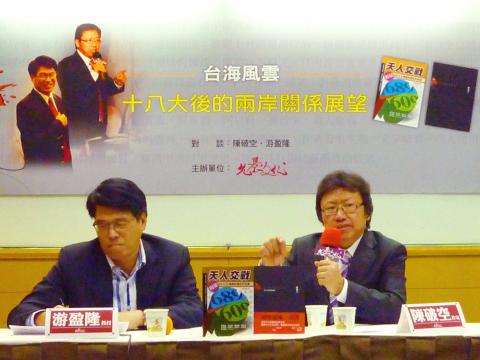A Chinese dissident yesterday urged Taiwan to insist on its values of democracy and human rights in its dealings with Beijing and be a partner in the international community’s effort of containing China, instead of taking China’s side.
Expressing concerns over Taiwan’s tilting toward China, former Chinese democracy activist Wilson Chen (陳破空), now a US-based writer, told a symposium that Taiwan “cannot become a gap in the global China-containment strategy.”
As outgoing Chinese President Hu Jintao (胡錦濤) brought up the issues of a peace treaty and a military confidence-building mechanism in his farewell speech at the Chinese Communist Party’s (CCP) 18th National Party Congress last week, Chen said Beijing would likely keep pushing for political negotiations with Taiwan after the new leadership takes over.

Photo: Chen Hui-ping, Taipei Times
If Taiwan did enter into negotiations with China, its best bargaining chip would be democracy and human rights, Chen said.
Citing Japan as an example, Chen said Tokyo had misjudged the political situation and misused its culture, which values humility. However, its deference toward Beijing did not bear fruit and improve Japan’s ties with China.
Taiwan should instead pattern itself after the Western powers, such as the UK, the US and France, by engaging China while bringing up democracy and human rights issues at every opportunity, he said.
“At the end of the day, China would not cut off its exchanges with Taiwan or attack Taiwan with missiles in retaliation. Taiwan should be brave enough to be a voice that hopefully will someday bring about changes in China,” Chen said.
In an analysis of the future political situation in China, the writer said that the recently concluded national party congress marked a major victory for the CCP’s conservative wing, so there would be neither political reform in China nor dramatic changes in Beijing’s Taiwan policy in the near future.

Alain Robert, known as the "French Spider-Man," praised Alex Honnold as exceptionally well-prepared after the US climber completed a free solo ascent of Taipei 101 yesterday. Robert said Honnold's ascent of the 508m-tall skyscraper in just more than one-and-a-half hours without using safety ropes or equipment was a remarkable achievement. "This is my life," he said in an interview conducted in French, adding that he liked the feeling of being "on the edge of danger." The 63-year-old Frenchman climbed Taipei 101 using ropes in December 2004, taking about four hours to reach the top. On a one-to-10 scale of difficulty, Robert said Taipei 101

Nipah virus infection is to be officially listed as a category 5 notifiable infectious disease in Taiwan in March, while clinical treatment guidelines are being formulated, the Centers for Disease Control (CDC) said yesterday. With Nipah infections being reported in other countries and considering its relatively high fatality rate, the centers on Jan. 16 announced that it would be listed as a notifiable infectious disease to bolster the nation’s systematic early warning system and increase public awareness, the CDC said. Bangladesh reported four fatal cases last year in separate districts, with three linked to raw date palm sap consumption, CDC Epidemic Intelligence

Two Taiwanese prosecutors were questioned by Chinese security personnel at their hotel during a trip to China’s Henan Province this month, the Mainland Affairs Council (MAC) said yesterday. The officers had personal information on the prosecutors, including “when they were assigned to their posts, their work locations and job titles,” MAC Deputy Minister and spokesman Liang Wen-chieh (梁文傑) said. On top of asking about their agencies and positions, the officers also questioned the prosecutors about the Cross-Strait Joint Crime-Fighting and Judicial Mutual Assistance Agreement, a pact that serves as the framework for Taiwan-China cooperation on combating crime and providing judicial assistance, Liang

US climber Alex Honnold left Taiwan this morning a day after completing a free-solo ascent of Taipei 101, a feat that drew cheers from onlookers and gained widespread international attention. Honnold yesterday scaled the 101-story skyscraper without a rope or safety harness. The climb — the highest urban free-solo ascent ever attempted — took just more than 90 minutes and was streamed live on Netflix. It was covered by major international news outlets including CNN, the New York Times, the Guardian and the Wall Street Journal. As Honnold prepared to leave Taiwan today, he attracted a crowd when he and his wife, Sanni,